- Home
- China Miéville
Kraken Page 8
Kraken Read online
Page 8
In the case of the alarm system she had installed in Billy’s doorway, for example, she had primed it specifically for ingress. That it might trip, even faintly, in the case of egress, was a product not of design but of Collingswood’s powerful but slapdash methods.
That would have bothered a perfectionist. But then that perfectionist would not have been alerted when intruders removed Billy from the flat that they had never broken into, as Collingswood, lurching awake and for several moments confused, her heart gonging and an aching in her ears, was.
Chapter Eleven
THEY WERE IN A BEAT-UP CAR. THE MAN GOSS DROVE. IN THE back, the boy, Subby, held Billy’s arm.
Subby had no weapon and did not grip hard, but Billy did not move. He was frozen by the man and boy having unfolded in his room—the intrusion, the drugged dragging of the world. Billy’s thoughts stuttered in loops. He felt dragged across time. A smear of pigeons was behind the car, pigeons that seemed to have been following him for days. What the hell what the hell, he thought, and Leon.
The car smelt of food and dust and sometimes of smoke. Goss had a face wrong for the time. He looked stolen from some fifties. There was a postwar cruelty to him.
Twice Billy’s hand twitched and he imagined a quick bundle and rush, throwing open the door and rolling into the street, away from these arcane kidnappers. Begging help from the shoppers in that Turkish grocer and the Wimpy hamburger place, running through, where were they, Balham? Each time the thought came Goss made a tch-tch noise and Subby’s hand would squeeze, and Billy would sit still.
He had no cigarette, but every few breaths Goss would exhale sweet woody smoke that would fill the car and go again. “What a ruddy night for it, eh?” he said. “Eh, Subby? What’s that pootling about? Someone’s out for a walk what oughtn’t was, don’t you coco? Someone’s woke up, Subby.” He wound down the window, an old hand-crank handle, looked up at the sky, wound it up again.
They hauled through streets of which Billy had lost all sense. They must be out in zone three or four where shops were keycutters and independent stationers. They passed no major chains. No west-coast coffee, not a Tescos. How could these be streets? Garages, timber-yards, judo gyms, cold pavements where rubbish moved quietly. The sky closed its last crack and it was night. Billy and his abductors were following rails, shadowing a lit-up train. It ushered them somewhere. They stopped by a dark arch.
“Chop chop,” said Goss. He looked up suspiciously and sniffed. He pulled Billy from the car. Billy thought he might puke. He reeled. Goss exhaled one of his smoky exhalations. He unlocked a door in corrugated iron and pushed Billy through into the black. Subby tugged from somewhere.
Goss spoke, as if Billy and he were in dialogue: “Is he then?” “Don’t know, might be, you got everything?” “Alright now, get the door, ready?”
Something opened. There was a change in the air on Billy’s face. Goss whispered, “Hush now.”
The room they were in smelt of damp and sweat. Something shifted. There was sound, a sputtering and crack. Lights came up.
There were no windows. The floor was dirty cement. The bricks sloped overhead were mapped with mildew. The chamber was huge. Goss stood by the wall holding a lever he had thrown. The room was full of lights, dangling on wires and jutting mushrooms from wall cracks.
Goss swore mildly as if at curious pigs. Billy heard a radio. A circle of people waited. Figures in leather jackets, dark jeans, boots, gloves. Some in band T-shirts, all in motorbike helmets. They held pistols, knives, cartoonishly vile nail-studded clubs. A radio played staticky classical music, fuzzed. There was a naked man on all fours. His lips fluttered. He had dials pushed into him, above each nipple. Unbleeding but extruding clearly from his body. It was from his open mouth that the radio sounds came. His lips moved to make the music, interference, the ghosts of other stations.
On a brick dais was a man. An older scrawny punk with spiked-up hair. A bandanna hid his mouth. His eyes were so wide he looked unhinged. He breathed hard, the cloth of his mask gusting in and out, and he was sweating in the cold. He was topless. He sat on a stool, his hands in his lap.
Billy was dizzy and sick from everything that night. Billy tried not to believe what he was seeing. Tried to imagine he might wake.
“Billy bloody Harrow,” the man said. “Check what that little bitch is doing.”
One of the figures in helmets twisted a dial on the radio-man’s chest, and radio-man’s mouth changed to sudden new shapes as the song ended. He whispered in little bursts and spoke barely audible interactions, men’s voices and women’s.
“Roger that ic-two, Sarge,” he said, and, “Have a word with Vardy, will you?,” and, “ETA fifteen minutes, over.”
“Not there yet,” the bandanna man said. “They’re visiting your old house.” His voice was loud and low, London-accented. Goss shoved Billy closer. “Send that lot, then,” he said. “Are you going to make me go through various motions, Billy Harrow? Can you just tell me who it is you’re with and what it is you’re doing? Can you tell me puh-lease what is going on tonight, what it is you set walking. Because something’s out there. And more to the bloody point, what, pray bloody tell, is your interest?”
“WHAT IS THIS?” BILLY WHISPERED AT LAST. “WHAT DID YOU DO TO Leon?”
“Leon?”
“You know how it is,” Goss said. “You’re both vying for the best vol-au-vent, and the next thing it’s all been eaten.”
Goss held Billy as if he were a puppet. Little Subby’s hands clutched Billy’s own.
“What’s going on?” Billy said. He stared everywhere, at the radioman; he struggled. “What is this?”
The sitting man sighed. “Bugger,” he said. “You’re going to do this.” His staring eyes did not change at all. “Let me put it to you this way, Billy. What the fuck are you?”
He twisted on his stool. He raised his hands a little. He was blinking violently. “Who are you working with?” he said. “What are you?” Billy realised that the kerchief was not cowboy-style but was haphazardly balled in his mouth. The man was gagged. He shook his hands and Billy saw he wore handcuffs.
“Turn your fucking head!” the voice continued, from this man who could not be speaking. “Turn around.” One of the helmeted guards slapped him hard across his face, and he screamed muffled into his gag. “Stand this bugger up.” Two guards hauled him up by his armpits. His head lolled. “Let’s see,” the voice said. The guards turned the man to face the back wall.
Colours appeared. The whole of the topless man’s back was a tattoo. At its edges it was wisps of coloured swirl, crossbred Celtic-knot fractals. In the centre was a big, dark-outlined, stylised face. Bold and expertly done. A man’s face, in unnatural colours. A sharp old face with red eyes, something between a professor and a devil. Billy stared.
The Tattoo moved. Its heavy-lidded eyes met his. Billy stared at it and the Tattoo stared back.
Chapter Twelve
BILLY SHOUTED IN SHOCK AND TRIED TO SCRABBLE BACKWARD. Goss held him.
The guards held the punk-haired man still. The Tattoo’s inked eyes went side to side, like an animation, as if it were a cartoon projected onto him. The thick black edges travelled, the shaded blue, blue-green, copper sections of skin shifting as the Tattoo pursed its lips, watched Billy, raised its eyebrows at him. It opened its mouth, and a hole of dark ink opened, a drawn throat. It spoke in that deep London voice.
“Where’s the kraken, Harrow? What’s your angle? What does Baron’s gang want with you?” The radio-man whispered static.
“What are you …?”
“Let me explain our problem,” the tattoo said. The man whose back it was on struggled in the guards’ grip. “My problem is no one knows you, Billy Harrow. You come out of nowhere. No one knows your percentage. And normally I couldn’t give a monkey’s what you’re up to, but that kraken, man. That kraken’s choice, mate. And it’s gone. And that’s trouble. Something like that, angel watching over it. If not very well,
eh? Here’s the thing—I can’t make sense of what you’ve done, or how. So how about you fill me in?”
Billy tried to think for anything, anything to say to make these impossible abductors let him go. He would tell them anything. But not a solitary word of the Tattoo’s questions made any sense at all.
The shadows shifted. “You’re running with Baron’s mob,” the Tattoo said. “Shit taste, but I can save you from yourself. Now you and me work together, we can’t have secrets. So bring me up to speed.” The Tattoo stared. “What’s the story?”
Men unfold and people are generators and ink rides a man.
“Look at him,” the Tattoo said. “This little prick’s a Christ, is he? You said there’s nothing in his house?”
“Buggery I could taste,” said Goss. He hawked and swallowed what he raised.
“Who took the kraken, Billy?” the Tattoo said. Billy tried. There was a long silence.
“Look,” Goss said. “He’s got knowledges.”
“No,” the Tattoo said, slowly. “No. You’re wrong. He don’t. I think we’re going to want to workshop this.” The man shook and moaned, and a guard hit him again. The Tattoo rocked with the body that bore it. “You know what we need,” the Tattoo said. “Take him to the workshop.” The man who was a radio whispered an ill-tuned-in weather report.
GOSS DRAGGED BILLY, MAKING HIS LEGS MOVE WITH A NEW LOCOMOTION like a cartoon caper. Little Subby followed.
“Get off me,” Billy gasped abruptly. Goss smiled like a grandfather.
“Attention one and all,” said Goss. “I love it when you’re very very quiet. Beyond this door,” Goss said, “just over the road, we can open up the old bonnet, take a look inside, see what’s making the old girl seize up like that.” He tapped Billy’s belly. “We’re all recyclers; we all have to do our bit, don’t we, for the global warming and the polar bears and that. We’ll find new life for her as a fridge.”
“Wait,” whispered Billy. Whispering was all he could do. “Listen, I can …”
“You can what, poppet?” said Goss. “I couldn’t live with myself if I let you get in the way of progress. There’s white-hot innovation around the corner, and we all have to be ready. We’ve never had it so good.”
Goss opened the door into the cold and a girder of streetlamp light. Subby went out. Goss sent Billy after him, onto his hands and knees. Goss came after him. Billy put up his hands. He felt a rush. He heard splintering glass.
Billy crawled away. Goss did not follow. Subby did not move. The air was still. Billy did not understand. Nothing moved but him, for one, two seconds, and he could hear nothing but his own heart. Then air rushed past his ears again, and only then, too late, glass from whatever window had broken hit the ground, and Goss moved, his head shaking in a moment’s confusion as he looked at space where Billy no longer quite was.
Something met Subby. “Huff,” Subby said, and hurtled metres away. A man-shape in darkness gripped a pipework club. Goss shrieked. The attacker slammed the metal into him. It rang as if he were metal too. Goss did not even stagger. He ran to where Subby lay supine, blinking.
The man with the pipe grabbed Billy. He was big, bulky but fast-moving, his hair cut close, his clothes black and scruffy. There was a faint edge of streetlight on him.
“Dane?” Billy gasped. “Dane.”
THEY RAN ALONG THE DIRTY LITTLE NON-STREET, BY THE RAISED tracks, away from the terrible archway. A train passed, rumbling lights in the sky. Somewhere behind them Goss knelt by Subby.
“Come on,” Dane said. Something ran along the bricks beside them, something Billy did not make out. “We’ve got two minutes before they’re up. We’ve got one minute before their boss realises what’s happened. You’re bleeding. Goss can taste it.”
Another train passed. From streets away came the noise of traffic. Dane bundled Billy on. “No way I can take them,” Dane said. “I only got him ’cause they weren’t expecting anything. Plus there was …”
Dane ran them an intricate route until they emerged from the brick maze. They were by a park, the only figures in the street. By the silhouettes of massed trees Dane unlocked a car and shoved Billy in.
Billy wore a beard of blood, he realised. His shirt was stained with it. At some point, the night’s rough handling had split his lip. He dripped.
“Shit,” he mumbled. “Shit, sorry, I …”
“One of his knuckleheads.” Dane said. “Put your seat belt on.” Something filthy scudded from the wall across the deserted road, out of a gutter into the car. The squirrel, coiling under a seat. Billy stared.
“Shtum,” Dane said. He pulled out and drove, fast. “If it weren’t for little sodding nutkin I wouldn’t have found you. It got onto Goss’s car.”
They turned into lights, reached a street where there were shoppers and drinkers by late cafés and amusement arcades. Billy felt as if he would cry, to see people. It felt like the breaching of some meniscus, like he had entered a real night at last. Dane passed him a tissue.
“Wipe your mouth.”
“Leon …”
“Wipe the blood. We don’t want to be stopped.”
“We have to stop, we have to go to the police …” Really? Billy thought even as he said that. You’re not there anymore.
“No,” Dane said, as if he were listening to that monologue. “We do not.” You know that, right? “We’re just going to drive. Wipe your mouth. I’m going to get you out of here.”
Billy watched a quadrant of London he recognised no more than if it were Tripoli go by.
Chapter Thirteen
“WELL THIS IS BLOODY FABULOUS, ISN’T IT? THIS IS BLOODY perfect.” Baron stomped around Billy’s flat. He shook his head at the walls, folded and refolded his arms. “This is just how it was supposed to go. This is peachy.”
He stamped past the team powdering for fingerprints. She had her back to them, but from where she stood examining Billy’s doorway, Collingswood got gusts of their resentment.
She could not hear thoughts. So far as she knew, no one could: they spilt from each individual head in too many overlapping and counterflowing streams, and the words that part-constituted some of those streams were contradictory and misleading. But irritation that strong communicated, and knowing it to be mistranslation, she—like most of those with any knack at all for that kind of thing—automatically translated into text.
whos this twat think he is
wankers shd fuck off let real coppers work
y r we leting that litl bitch smoke
She turned and spoke to the thinker of that last fragment. “Because you been told to let us do whatever we want, innit?” she said, and watched the blood leave his face. She stepped over dropped books and followed Baron. She picked up the post on the table.
“Well?” Baron said. “Any ideas?”
Collingswood unlistened, focused on the traces of Billyness. Touched with a fingertip the doorframe, where stains of Billy’s attention read to her like messages squint-seen through a broken screen.
whats this she did that girl
cant get in
shes fit i wouldn’t mind
“What are you bloody smirking at?” Baron said. “Got something?”
“Nothing, boss,” she said. “You know what? No. You got me. This thing was still primed when I got here, you know? That’s why I had to let you in. No entry without invite, and you saw Billy boy—he was way too chickenshit to let anyone he didn’t know in after what we told him.”
“So what’s happened? He’s hardly just gone for a bloody walk, has he?”
“Nah.” She shrugged at the signs of scuffles. “Someone’s took him.”
“Someone who couldn’t get in.”
She nodded. “Someone who didn’t get in,” she said.
Vardy emerged from the bedroom, where he had been examining Billy’s bits and pieces. He joined them in the kitchen.
“That ain’t all,” Collingswood said. She made shapes with her hands, chopped the air up.
“Something big happened tonight. Big like when the kraken got took. I don’t know what it is, but something’s wandering around out there.”
Baron nodded slowly. “Prof,” Baron said. “Any thoughts from your good self? Wish to revise your opinion about the unlikelihood of any attacks by your teuthists?”
“No,” said Vardy shortly. He folded his arms. “I do not. Care to revise your tone? Can’t tell you what’s gone on here or who’s done what to whom, but seeing as you ask, no. This does not read teuthism to me.” He closed his eyes. His colleagues watched him channelling whatever it was he channelled when he did what he did. “No,” he said, “this does not feel like them.”
“Well,” Baron said. He sighed. “We’re on the back foot here, ladies and gents. Our star witness and intended colleague is gone AWOL. We know the guard system was up and running. Doing what it was supposed to. But we also know it had both been tripped and not been tripped. Do I have that right?”
“Sort of,” Collingswood said. “It went off in reverse. Woke me up. I couldn’t work out what it was at first.”
“It would cover windows, too?” Vardy said. She stared at him. “Fine,” he said. “I have to ask.”
“No you don’t,” she said. “I told you. No one could get in.”
“No one?”
“What’s your point? I ain’t saying there’s no one stronger’n me out there—you know there is. If anyone got in, it would go off and I’d know. No one broke in …” She stopped. She looked one by one at the post. She looked at the cardboard book box. “No one broke in,” she said. “Someone sent him something. Look. There’s no stamp, this was hand-delivered.” She hefted it. She sniffed it.
Vardy unfolded his arms. Collingswood moved her fingers over the paper, whispered, ran little routines and subroutines.

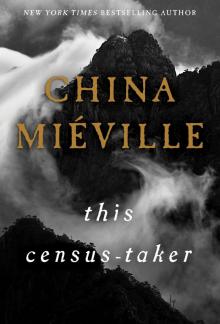 This Census-Taker
This Census-Taker Jack
Jack October: The Story of the Russian Revolution
October: The Story of the Russian Revolution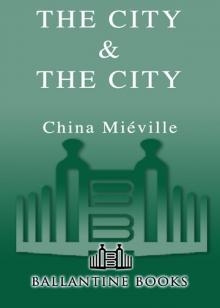 The City & the City
The City & the City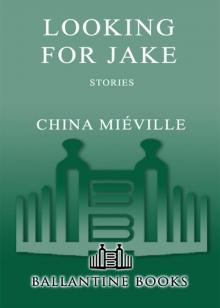 Looking for Jake: Stories
Looking for Jake: Stories Perdido Street Station
Perdido Street Station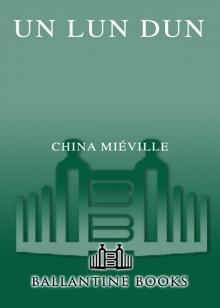 Un Lun Dun
Un Lun Dun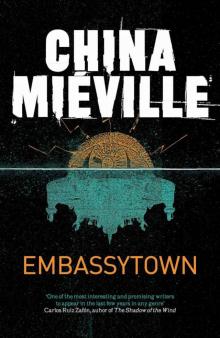 Embassytown
Embassytown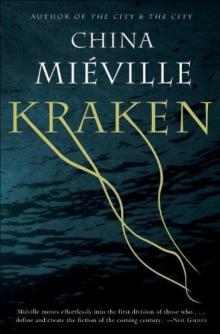 Kraken
Kraken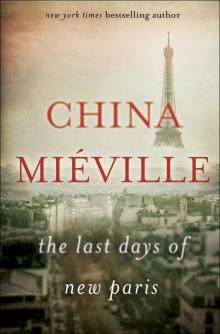 The Last Days of New Paris
The Last Days of New Paris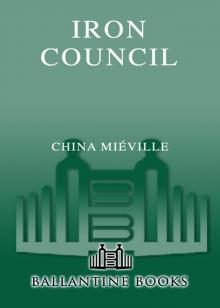 Iron Council
Iron Council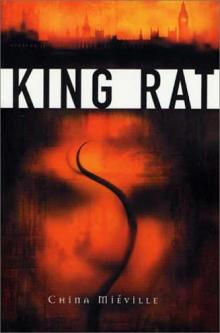 King Rat
King Rat Three Moments of an Explosion
Three Moments of an Explosion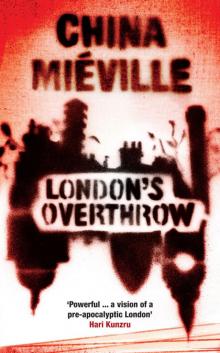 London's Overthrow
London's Overthrow October
October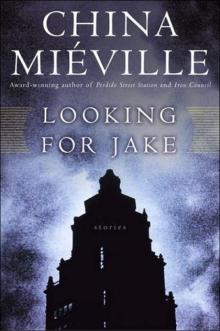 Jack (new crobuzon)
Jack (new crobuzon) Looking for Jake and Other Stories
Looking for Jake and Other Stories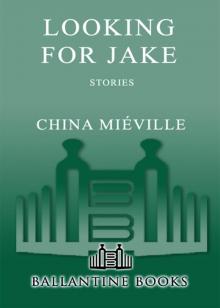 Looking for Jake
Looking for Jake